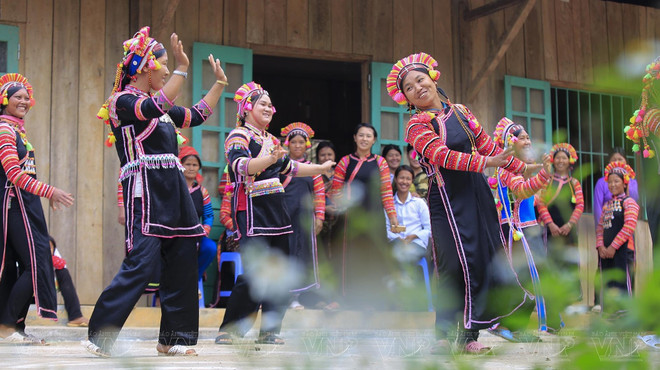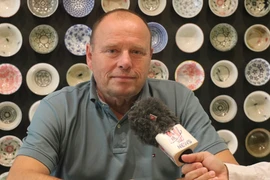
Hanoi (VNA) – By successfully implementing people-centred policies, Vietnam has obtained remarkable achievements in ensuring human rights, thus winning recognition and valuation from the international community.
It is not hard to identify those who are plotting to drive a wedge into the great national solidarity bloc and sabotage the Party and State of Vietnam. They are hostile organisations or short of poor sympathy to Vietnam but give themselves the right to comment on or judge the human rights situation in the country. They also include extremist forces in political circles of some Western nations or overseas reactionary Vietnamese organisations which made hostile and discontented allegations aimed at denying Vietnam’s achievements in human rights promotion and protection.
They often spread wrongful and distorted information on social networks to sow skepticism in the public and erode people’s trust in the Party’s leadership and the State’s governance and management, attempting to cause political and socio-economic instability and lower Vietnam’s reputation and stature in the international arena.
Some organisations like Human Rights Watch, Amnesty International, Reporters Without Borders, Freedom House, and the US Commission on International Religious Freedom have released annual reports with one-sided and poorly objective views about the human rights situation in Vietnam.

By successfully realising the advocate of “taking the people as the centre”, Vietnam has reaped prominent and noteworthy achievements in ensuring human rights recognised and highly valued by the international community.
The Resolution of the 13th National Party Congress affirmed the Party and State’s consistent policy on guaranteeing and promoting human rights, in which people are both the centre and the key players. This was both enshrined in the 2013 Constitution and many other relevant legal documents, and has also been reflected through the country’s efforts in guaranteeing and promoting fundamental human rights on politics, economy, and culture, among others, as well as in ensuring gender equality and protecting vulnerable groups in society.
Philip Fernandez, member of the Canada - Vietnam Friendship Association, said under the challenge-tested leadership by the Communist Party of Vietnam, structures have enabled people to become equal members in the political regime and economic conditions.
Political rights are among the citizens’ rights that Vietnam has been strongly promoting and achieving good results from. Since joining the International Covenant on Civil and Political Rights in 1982, the country has been unceasingly codifying the provisions in perfecting its legal system. The 2013 Constitution, the 2011 Law on Complaints, the 2015 Law on Election of Deputies to the National Assembly (NA) and People’s Councils, the 2015 Law on Referendum, and the 2018 Law on Denunciations are important legal bases for the people to exercise their political rights, participate in administration building and the management of the state and society, join in the discussion of the country and localities’ common issues, and give opinions on draft legal documents directly or indirectly through representative agencies.

The NA’s question-and-answer sessions and such programmes as “People ask - Ministers answer” or “People ask - Leaders answer” have become regular dialogue channels attracting the public’s attention and support, showing people’s increasing awareness and bringing into play of their political rights to contribute to national development.
Ensuring gender equality is another outstanding attainment by Vietnam. The strong rise of Vietnamese women, especially in politics, can be seen in the fact that Vietnam is among the leading countries in the rate of women parliamentarians, which has increased continuously in recent tenures.
Colombian Ambassador to Vietnam Miguel Angel Rodriguez Melo has stressed that the Southeast Asian nation has made great strides in realising the UN Sustainable Development Goal (SDG) on gender equality and women empowerment. Meanwhile, Moroccan Ambassador Jamale Chouaibi has also affirmed that Vietnam is one of the most successful models in gender equality promotion, and recognised the country’s efforts in empowering women in remote and ethnic minority areas.
Protecting the rights of the vulnerable groups and ensuring the living conditions for all people in society are also a focus of the Vietnamese State’s policies.
In its report “From the last mile to the next mile”, issued in April 2022, that provides a Vietnam poverty and equity assessment, the World Bank said poverty in the country has declined impressively over the last decade, with many positive trends emerging, including the considerable improvement in the poorest groups in rural and remote areas and ethnic minority communities. On the basis of the lower-middle income standards, the poverty rate in Vietnam fell from 16.8% to 5% between 2010 and 2020, with more than 10 million people assisted to get out of poverty.
Through the four waves of the COVID-19 pandemic, even in the tensest period caused by the Delta variant in mid-2021, the Vietnamese Party and State made all-out efforts to guarantee people’s rights such as accessing free vaccination and health care, benefiting from social security packages so that no one is left behind. Rana Flowers, Acting UN Resident Coordinator in Vietnam and UNICEF Representative, said with the efforts to contain the pandemic over the past two years, Vietnam has become a role model in the world and one of the countries with the highest vaccination rates to protect people, including the poorest and the most vulnerable.

As the COVID-19 pandemic is threatening the realisation of the SDGs, Vietnam has still been assessed as having fruitfully implemented these goals to promote human rights. With a score higher than the average of many other Asian-Pacific countries, it ranked 51st among the 193 UN member states in terms of SDGs realisation.
Terence D. Jones, an official of UNDP Vietnam, said Vietnam is in the top group among the three of countries with the best progress in the SDG implementation in Asia.
In late March 2022, at the launch of Vietnam's voluntary mid-term report on the implementation of the Universal Periodic Review (UPR) Third Cycle recommendations and the announcement of the country’s candidature to the UN Human Rights Council for 2023 - 2025, Rana Flowers highly valued Vietnam’s commitments and efforts to promote and protect human rights. The launch of this report also clearly demonstrated the country’s sense of responsibility, transparency, and seriousness towards the UPR and the implementation of international commitments on ensuring human rights.
Party General Secretary Nguyen Phu Trong has emphasised that all the Party’s guidelines and the State’s policies, laws, and activities are for the sake of the people.
They create the foundation for the recognisable strides in Vietnam’s efforts to guarantee human rights. They also serve as vivid illustrations of the righteousness in the Party and State’s guidelines and policies in this regard. Therefore, the hostile forces’ allegations aimed at taking advantage of human rights issues to force a wedge into the great national solidarity bloc have come to nowhere, become unpersuasive, and even backfired./.





























